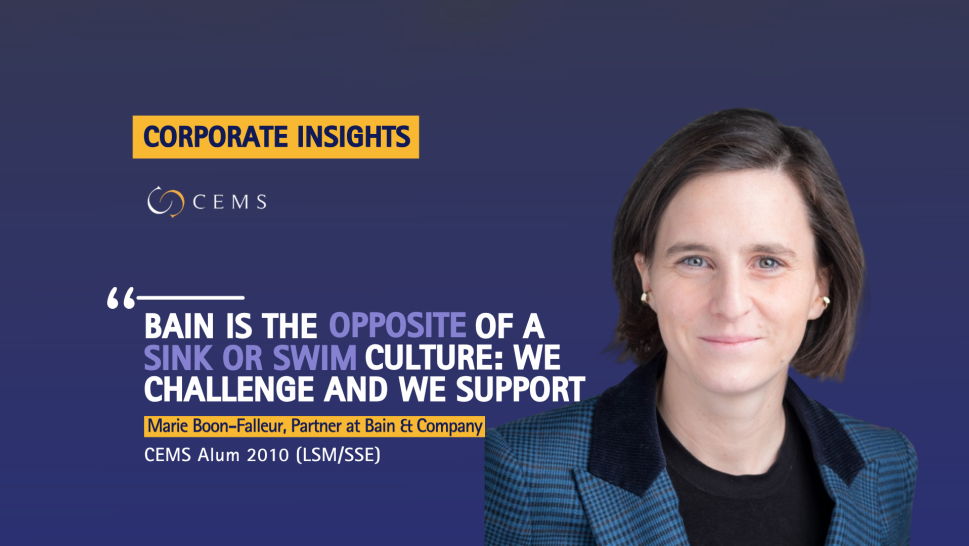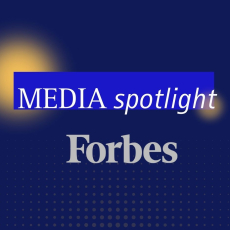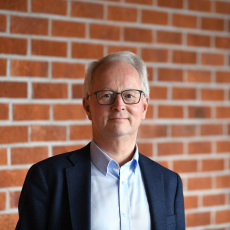WHAT’S YOUR STORY?
Marie Boon-Falleur: Partner at Bain & Company in Healthcare & Life Science Practices in New York City.
Tenure with Bain: 15 years+
Previous experience: Internship with Procter & Gamble in Product Supply, Finance and Accounting.
CEMSie? Yes! Graduated in 2010.
WHY BAIN?
Coming into the company, I was looking to be challenged and I wanted a vigorous pace of learning, which is precisely what Bain has delivered. Then there was the culture. You know when you meet people and you click? It felt right in the interview process and it has felt right for the last 15 years. I still just love Bain as a place to work. And partly that’s because of the impact that I can have with different clients, and partly it’s the sheer quality of the teams I’m working with on a day-to-day basis. In my tenure here, I’ve also experienced extraordinary mentorship and career growth, which makes for a pretty incredible combination.
And you see it in employee satisfaction feedback. Bain is rated #1 on Glassdoor for instance!
BAIN STILL “FEELS RIGHT” AFTER 15 YEARS. WHAT IS THAT HAS KEPT YOU HERE?
It’s the culture. And you really feel it inside the teams that you work with here. There is a strong learning and coaching culture which is the polar opposite of a “sink or swim” kind of culture. The work is super challenging – no one here will tell you it’s an easy path at all—but you feel challenged and supported at the same time.
We are a feedback culture. At Bain, there are structures in place that support you continuously: you have a mentor, a professional development advisor—someone senior in the company, a senior manager or a partner, who you can talk to and who can advise you. And that person is not your direct boss. They are more of a sounding board to talk to every couple of weeks, so you always know where you’re at. And I personally think that’s great.
We’re also a work hard, play hard culture. We have fun and we don’t take ourselves too seriously. Humility is also a really strong value here.
HUMILITY IN WHAT SENSE?
Well, we take care to prioritise humility working with our clients. We don’t go into engagements talking down to our clients, or assuming we have all the answers. We have great respect for their expertise and we understand the importance of listening to them.
WHAT KINDS OF CLIENT ENGAGEMENTS DO YOU HAVE?
For the last five years, I’ve been part of our healthcare practice working with corporate clients in the sector. The types of engagements that I lead are mostly around transformation – companies that are looking to pursue meaningful change programmes that are cross-functional in nature. These can be growth oriented where you might be looking at changing your go-to-market strategy for example. They can also be around performance improvement.
That might sound quite broad, but it’s one of the things I love about my job. I’m never cornered in a specific topic or a specific part of the industry.
HOW DOES BAIN WORK?
A typical Bain team is four to six members, a senior manager and then you will have two or three partners who are involved in the engagement. My role would be one of the partners leading these teams.
My teams will change for each engagement. There will be a number of senior managers that I work with on a regular basis within our healthcare practice and I get to know them well, but consultancy is a model where people want to see a variety of clients and sectors, so I change team members all the time. Again this is something I like about the job. An engagement can be anything from a high-octane three-week diligence piece with investors or a longer, six-month or 12-month integration project for instance. So, I’m getting to meet new people within the organisation all the time, which is great. Often we work with the same clients on different engagements, and although the teams will change, my engagement with the client remains continuous.
WHAT’S LEADERSHIP TO YOU?
I think it’s inspiring others. When I start a new engagement with a team, I’d love for everyone to feel more enthusiasm to stay at Bain once they’ve worked with me versus when they started. I want them to feel they’re learning, they’re stretched and supported. And when they see what I’m doing, it feels like something they want to do too.
ANY MYTHS ABOUT CONSULTING YOU’D LIKE TO DEBUNK?
A lot of people think there’s no work-life balance in consulting. But I have two kids, I spend time with my family, and I take eight weeks of vacation each year. Yes, we want to do great work for our clients, but if we’re not happy as human beings, we can’t be good advisors to our clients or good leaders to our teams.
Going into consulting is like running a marathon. There will be hard moments for sure, but you power through them. And at the end of the day, the learning and the satisfaction that you get are so rewarding.
IS THERE SUCH A THING AS A TYPICAL CONSULTANT?
I don’t know if there’s a typical consultant. But if you want to excel in consultancy, I’d say you should be a fast learner because you’ll be thrown into different contexts and industries all the time. You need to be like a sponge! Your expertise should be: I’m really good at learning!
Then at Bain, I’d say there are a set of cross-sectional qualities that matter and that remain the same wherever you work. What makes you a great Bainie in Brussels is the same that makes you a great Bainie in Hong Kong or New York. We value rigour in thinking, business judgement, empathy, feeling a cause in your work and being a good team member wherever you are. And that’s great, because if you want to relocate to a different geography within Bain, it’s understood that your credit or credibility will travel with you.
HOW IS THE WORLD OF CONSULTANCY CHANGING IN 2025? ANYTHING YOU CAN SHARE AS AN “INSIDER?”
Two things. First, gone are the days of building a five-year strategic plan. Your plan will be stale within 12 months.
The pace of change is so fast it’s rewriting the rules of the game. So too is AI. Ten years ago you might have looked to a consultancy team to do your market research. Today, GenAI can do that for you. So, as consultants we have to constantly reinvent ourselves. The challenge ahead of us now is to keep raising the bar on the value we can deliver to our clients. Continuing to do the work in the old ways, thinking we are better than AI at the same tasks, is delusional. We need to leverage AI to do those tasks faster and learn how to work differently, from analyst to partner.




